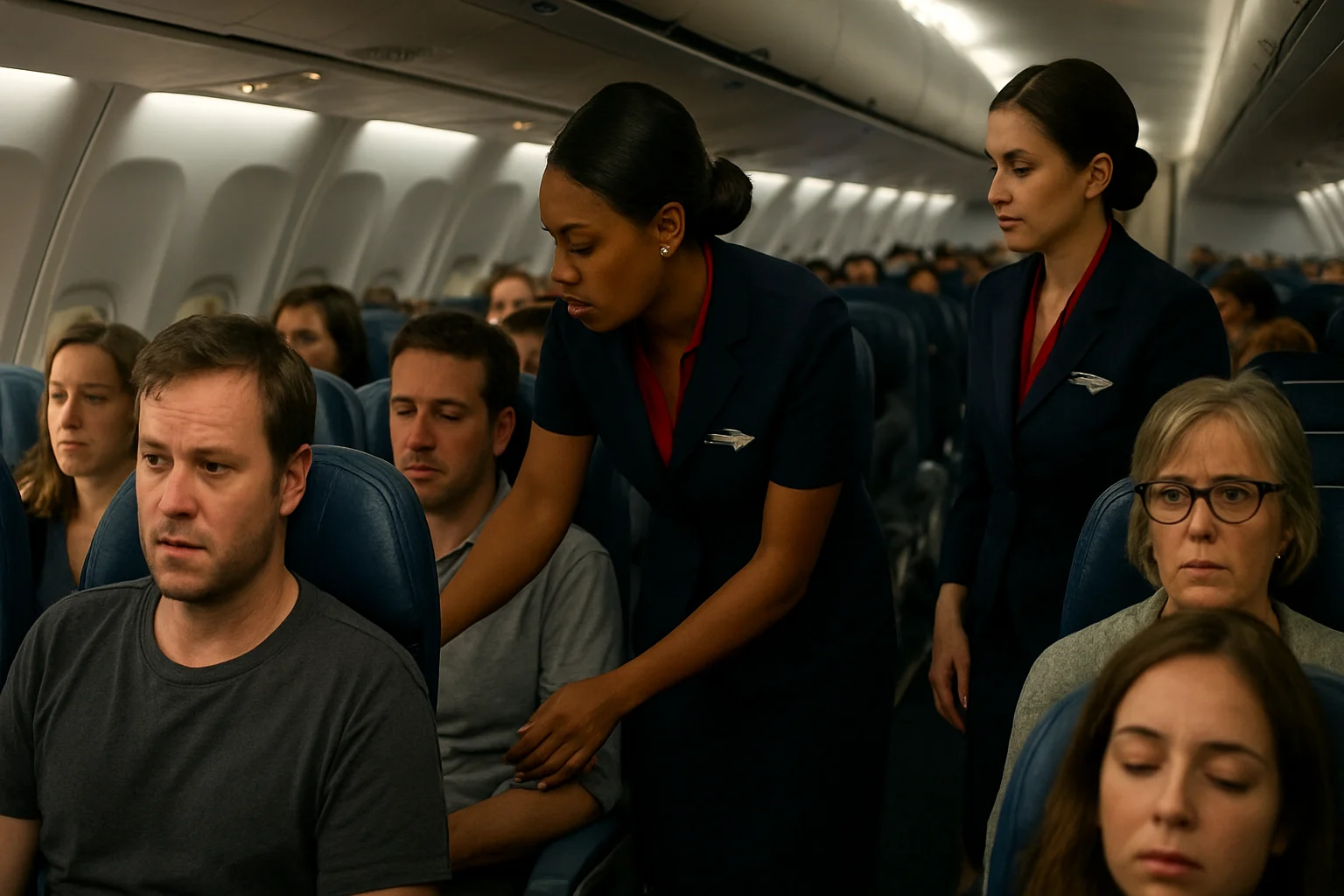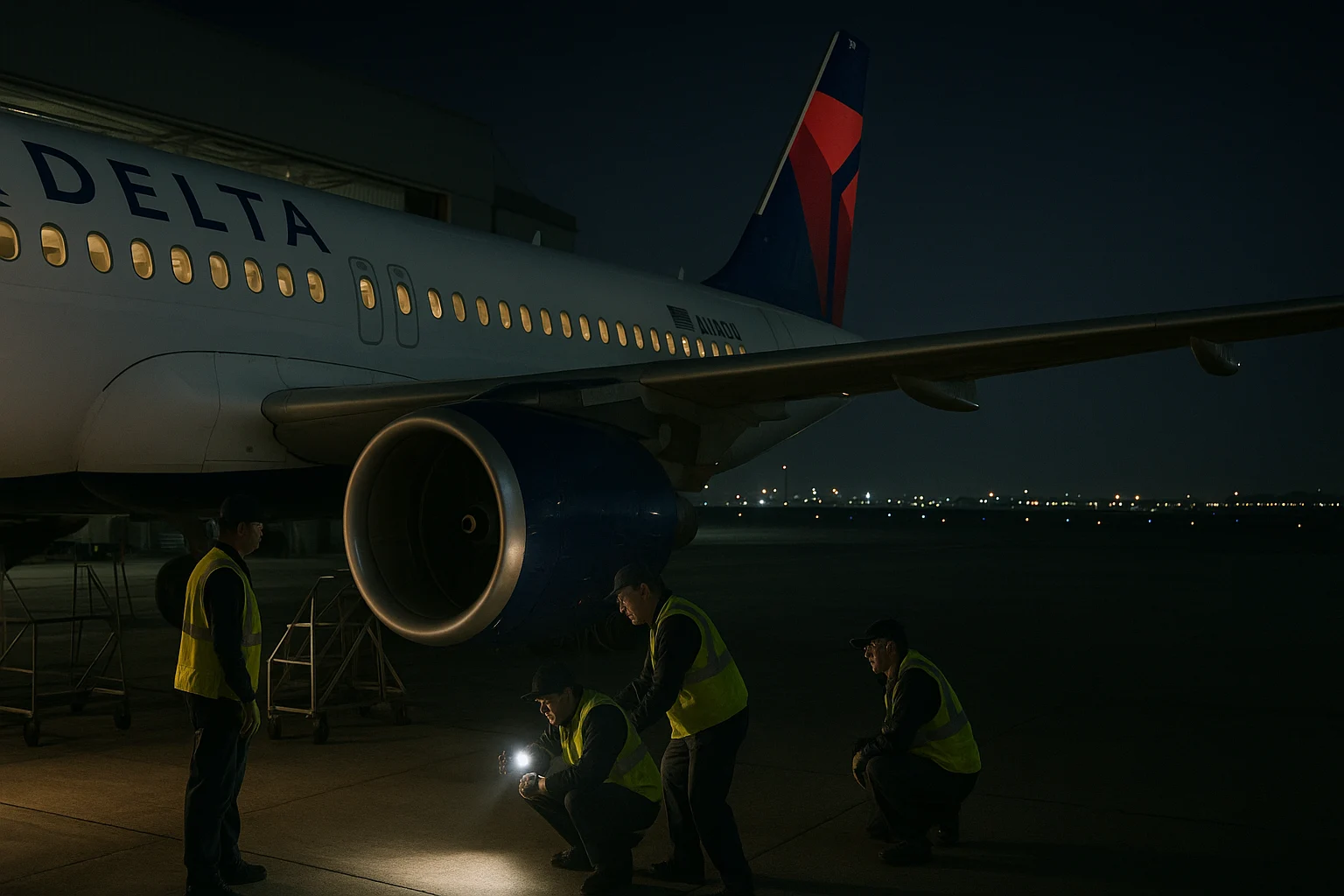Delta Flight DL275 diverted LAX after a technical issue forced the aircraft to change course mid-flight. The Airbus A350, originally traveling from Detroit to Tokyo Haneda, landed safely at Los Angeles International Airport when its engine anti-ice system malfunctioned. Thanks to quick action by the crew and support from Delta and LAX staff, all passengers remained safe and were assisted with rebooking and onward travel.
Delta experiences flight diversions sometimes but an Airbus A350 with international travelers making an unplanned stop triggers important questions. What caused the incident to occur? What did the passengers go through during the event? How did Delta together with LAX react to this situation?
In this article, we’ll break down the full story of DL275, covering the reasons behind the diversion, the official response, passenger experiences, and what this incident tells us about aviation safety.
Why Did Delta Flight DL275 Diverted LAX?
When passengers first heard that Delta Flight DL275 was diverted LAX, many wondered: was it weather, or something mechanical? Flight diversions can happen for a variety of reasons, but in this case, it was a mechanical concern that demanded immediate attention.
Mechanical or Weather Concerns
The DL275 rerouting stemmed from an engine anti-ice system failure rather than standard weather-related issues that typically cause flight diversions. The engine anti-ice system failed on the aircraft which stopped it from preventing ice accumulation on jet engines during high-altitude flight conditions.
The aircraft could not proceed with the malfunctioning system so it had to land at the nearest facility that maintained Delta planes and Airbus A350 specialists. The flight crew needed to reroute to the nearest Delta maintenance facility with Airbus A350 specialists so they chose Los Angeles as their landing destination despite it being farther from their current location.
Read More
Passenger Safety Protocols
The crew implemented Delta’s emergency landing protocols after they verified the problem. The pilots maintained regular contact with air traffic control while cabin staff provided passengers with regular updates to keep them calm.
The safety protocols of aviation dictate that all precautionary diversions must take precedence over flight schedules. The flight diversion protected every passenger and crew member on board as no injuries or emergencies occurred throughout the operation.
The airline industry’s fundamental importance of diverted flight safety protocols becomes evident through this swift reaction because these protocols provide pilots with immediate decision-making powers to handle in-flight mechanical problems.
Timeline of the DL275 Incident
When news spread that Delta Flight DL275 diverted LAX, many were curious about the exact sequence of events. A clear timeline helps passengers and aviation observers understand how quickly the crew acted once the issue was detected.
When the Diversion Was Announced
During the midpoint of the Pacific crossing the flight deck detected an issue with the engine anti-ice system. Following this the captain informed passengers that the flight would redirect to a different airport instead of continuing to Tokyo due to safety concerns.
Passengers said that the crew maintained a composed demeanor together with precise explanations which helped reduce passenger anxiety. Aviation professionals view diversions as positive indications because they demonstrate that safety systems operate effectively.
Arrival at Los Angeles International Airport (LAX)
The Airbus A350 completed its approach to Los Angeles International Airport before successfully landing at LAX without any problems. The emergency services remained ready to respond but the landing required no assistance since it proceeded normally.
Delta personnel together with airport workers worked immediately to provide support to passengers who needed to reschedule their flights and obtain hotel stays and travel connections after the flight’s arrival at the gate. The situation at LAX demonstrated impressive flight diversion handling through rapid intervention by airline personnel together with airport staff for numerous passengers.
Passenger Experience on DL275
For travelers on Delta Flight DL275 diverted to LAX, the experience was more about reassurance than fear. While a mid-air diversion can create uncertainty, the way Delta’s crew communicated and handled the situation left many passengers impressed.
In-Flight Announcements and Crew Communication
Shortly after the cockpit confirmed the technical issue, the captain addressed the cabin directly. The message was calm, clear, and transparent: the flight would no longer continue to Tokyo but would divert to Los Angeles International Airport for safety reasons.
The cabin crew followed up with frequent diverted flight announcements, keeping passengers updated on progress and answering questions. For many travelers, these updates eased nerves and turned what could have been a stressful moment into a manageable delay.
What Passengers Shared on Social Media

As expected in today’s digital age, several passengers quickly turned to Twitter (X) and other platforms to share their experiences. Posts using hashtags related to DL275 spread fast, with many praising the professionalism of Delta’s crew and the smoothness of the diversion process.
Some travelers even uploaded short clips of the captain’s announcement, noting how the communication helped keep everyone calm. Others highlighted how quickly Delta arranged rebooking and accommodations once the flight reached LAX.
Overall, social media reactions painted the diversion as an example of how airlines can manage unexpected challenges without creating panic.
Airline and Airport Response
When Delta Flight DL275 diverted to LAX, both the airline and the airport were quick to act. A smooth diversion doesn’t just rely on the pilots, it’s a coordinated effort between the airline’s operations team, ground staff, and airport authorities.
Delta Airlines’ Official Statement
Within hours of the incident, Delta Airlines released an official statement addressing what happened. The airline confirmed that the diversion was due to a mechanical issue involving the engine’s anti-ice system and emphasized that at no point were passengers in danger.
Delta also highlighted its commitment to putting safety before schedule, reassuring the public that diversions are precautionary measures designed to protect everyone onboard. The statement was shared widely in the news and across Delta’s official channels, showing how transparency plays a big role in maintaining passenger trust.
How LAX Handled the Unscheduled Arrival
For Los Angeles International Airport, unscheduled diversions are nothing new. Still, handling a wide-body Airbus A350 carrying hundreds of international travelers requires tight coordination.
Upon landing, LAX emergency protocols were immediately activated. While fire and rescue crews stood by, their services weren’t needed because the landing was smooth. The airport then shifted focus to processing passengers through customs, helping with baggage transfers, and coordinating with Delta staff for rebooking.
The efficiency of airport handling for a diverted flight showed why LAX is one of the top choices for major international diversions. Its large facilities, multiple runways, and experienced staff make it uniquely prepared for sudden arrivals like DL275.
Broader Context: Flight Diversions in the U.S.

While the story of Delta Flight DL275 diverted to LAX drew global attention, it’s important to remember that diversions aren’t rare in aviation. Airlines across the U.S. face situations where flights must change course for safety or logistical reasons.
Common Reasons Flights Get Diverted
Planes don’t just divert because of mechanical problems. In fact, there are several reasons why a captain may decide to reroute:
- Severe Weather: Thunderstorms, hurricanes, or strong crosswinds can make an airport unsafe to land.
- Medical Emergencies: If a passenger falls seriously ill, the flight may divert to the nearest suitable airport.
- Technical Issues, Like in DL275’s case, when a mechanical fault makes continuing unsafe
- Air Traffic Control Restrictions: Congestion or unexpected closures at the destination airport can force a diversion.
- Fuel Concerns: In rare cases, flights may need to stop to refuel if delays extend travel times.
These U.S. flight diversion reasons highlight how multiple factors can affect a journey, with safety always being the top priority.
Previous Notable Diversions by Delta Airlines
DL275 isn’t the first time Delta Airlines has diverted a flight, and it won’t be the last. Over the years, the airline has faced similar incidents:
- 2018, A Delta flight bound for Seoul diverted due to a mechanical concern, landing in Anchorage.
- 2022, Severe storms forced several Delta flights headed to Atlanta to reroute to nearby airports.
- 2023, A Delta international flight made headlines when it diverted for a medical emergency mid-Atlantic.
Each of these cases, like DL275, underscores Delta’s diversion history and commitment to proactive safety measures. While diversions may be inconvenient, they are proof that the system works to protect passengers.
Passenger Options After a Diversion
For travelers on Delta Flight DL275 diverted to LAX, the journey didn’t end when the plane touched down. A diversion often triggers a chain of next steps involving compensation, rebooking, and sometimes travel insurance claims.
Compensation and Rebooking Policies
Delta is known for handling diversions with a focus on minimizing passenger stress. After DL275 landed at LAX, passengers were provided with rebooking assistance, hotel accommodations, and meal vouchers where needed.
While compensation policies vary, Delta’s customer service team typically assists with: rebooking passengers on the next available flights, covering reasonable expenses during unexpected overnight stays, and ensuring smooth onward travel. For many travelers, this helps turn an inconvenience into a manageable delay rather than a travel disaster.
Travel Insurance and Passenger Rights
The DL275 diversion teaches people that insurance coverage and passenger rights prove essential beyond common awareness levels. Flight diversions caused by mechanical failures or adverse weather conditions prompt airlines to fund basic needs yet insurance policies extend protection through reimbursement for extra accommodation expenses and missed travel connections together with lost destination bookings.
International travelers receive protection through established aviation regulations which provide basic care and assistance together with alternative travel solutions to diverted flights. Delta followed the required standards by providing full support to all passengers when DL275 encountered its diversion situation.
Conclusion: Delta DL275 and the Assurance of Aviation Safety
The redirection of Delta Flight DL275 to LAX demonstrates that safety remains the primary concern in aviation operations. The diversions demonstrate both the robustness of contemporary air travel infrastructure and the expertise of airline personnel.
The airline demonstrated transparency and care through its entire handling of the problem starting from its initial detection until the LAX safe landing. The airline ensured passenger safety during the entire process while providing complete information and support to passengers after their arrival. The flight DL275 represents more than a diversion story because it demonstrates that aviation protocols function perfectly according to their intended design.
The event strengthens Delta’s reputation among travelers as well as the entire airline industry’s credibility. The safety of passengers remains constant above all else even when planes must alter their routes to reach destinations safely at any cost.
FAQs About Delta Flight DL275 Diversion
1. Was anyone injured on Delta Flight DL275?
No, there were no injuries. The diversion was purely precautionary, and passengers remained safe throughout the flight.
2. Why did Delta Flight DL275 divert to LAX?
The aircraft had an engine anti-ice system issue. LAX was chosen because it had the right maintenance facilities and Delta support.
3. How often do Delta flights divert to LAX?
Diversions to LAX happen a few times each year. Most are linked to weather, medical needs, or technical concerns.
4. What happened to the passengers after the diversion?
Passengers were rebooked on later flights. Delta also provided accommodations and assistance for onward travel.
5. Is it common for Delta to divert flights?
Yes, but not frequently. Diversions are rare and only occur when safety or operational issues require it.



